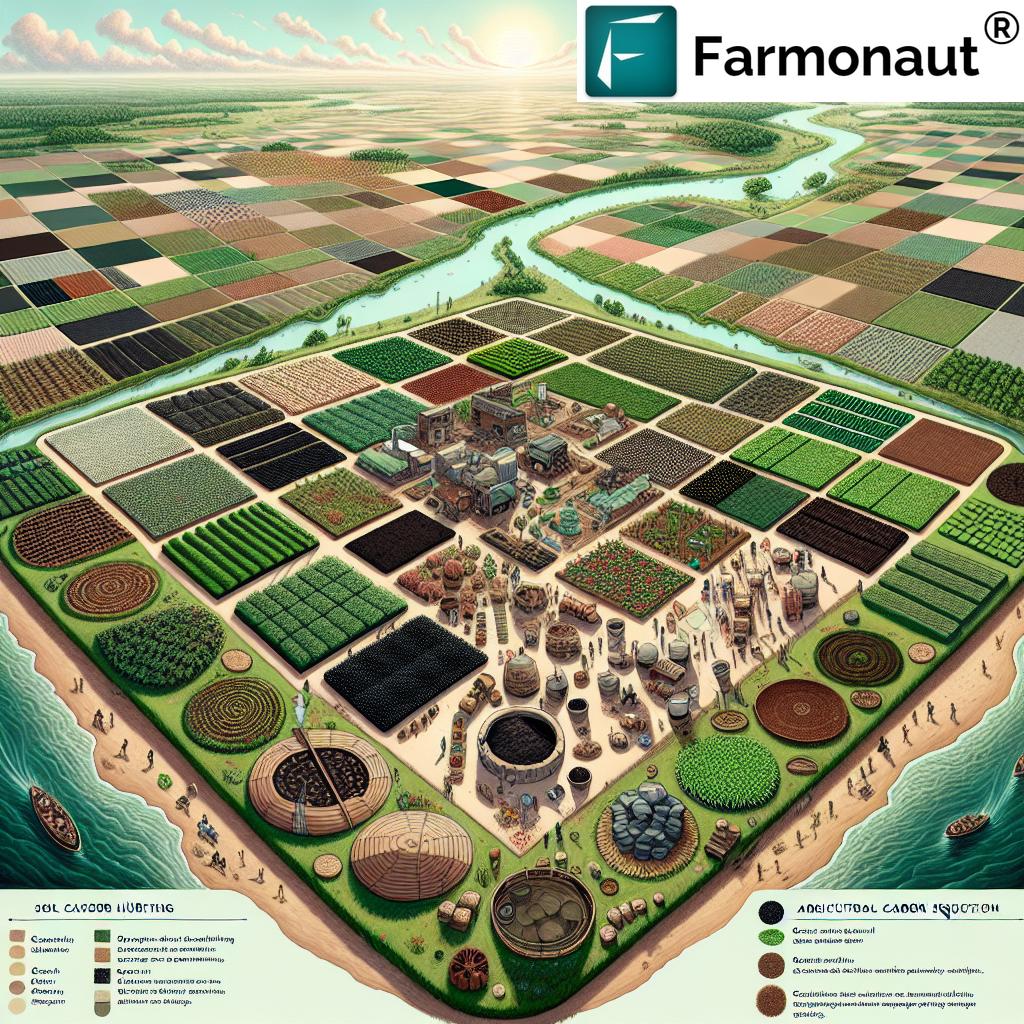Revolutionizing Egyptian Agriculture: Sustainable Practices for Climate Resilience and Smallholder Empowerment
“Regenerative farming techniques can sequester up to 10 tons of carbon per hectare annually, significantly mitigating climate change.”
At Farmonaut, we are excited to explore the groundbreaking developments in sustainable agriculture practices and climate change mitigation in agriculture that are taking center stage at a major international conference. As pioneers in agricultural technology, we recognize the immense potential of regenerative farming techniques and organic farming benefits in revolutionizing the agricultural sector, particularly in Egypt. In this comprehensive blog post, we’ll delve into innovative approaches for enhancing soil health, water conservation, and carbon sequestration in farming, with a special focus on how these practices are transforming Egyptian agriculture.

The Emergence of Sustainable Agriculture in Egypt
Egypt, a country with a rich agricultural heritage, is at the forefront of adopting sustainable agriculture practices. The recent COP29 conference in Cairo has highlighted the crucial role that organic and biodynamic agriculture methods play in combating climate change and ensuring food security. Let’s explore how these practices are reshaping the landscape of Egyptian farming:
- Organic Farming: Egyptian farmers are increasingly adopting organic farming techniques, which eliminate the use of synthetic pesticides and fertilizers. This shift not only improves soil health but also produces healthier crops and reduces environmental pollution.
- Biodynamic Agriculture: This holistic approach to farming, which considers ecological and spiritual aspects, is gaining traction in Egypt. Biodynamic methods focus on creating self-sustaining farm ecosystems, enhancing biodiversity, and improving soil fertility naturally.
- Water Conservation: In a country where water scarcity is a pressing issue, innovative irrigation techniques and water-efficient crops are being implemented to maximize water use efficiency in agriculture.
These sustainable practices are not just environmentally friendly; they’re also proving to be economically viable for Egyptian farmers, especially smallholders.
The Role of Carbon Credits in Sustainable Agriculture
One of the most exciting developments in sustainable agriculture is the growing importance of carbon credits for farmers. The voluntary carbon market in agriculture is opening up new opportunities for Egyptian farmers to be rewarded for their environmentally friendly practices. Here’s how it works:
- Farmers adopt sustainable practices that sequester carbon in the soil or reduce greenhouse gas emissions.
- These practices are quantified and verified, generating carbon credits.
- The credits can be sold on the voluntary carbon market, providing an additional income stream for farmers.
This system not only incentivizes sustainable farming but also helps combat climate change by reducing overall carbon emissions. At Farmonaut, we’re particularly excited about how technology can play a role in measuring and verifying these carbon credits, making the process more accessible to smallholder farmers.
Empowering Smallholder Farmers in Egypt
“Smallholder farmers produce 80% of the food consumed in developing countries, making their empowerment crucial for global food security.”
Smallholder farmer empowerment is at the heart of Egypt’s agricultural revolution. These farmers, who form the backbone of the country’s agricultural sector, are being equipped with knowledge, resources, and technology to adopt sustainable practices. Here’s how this empowerment is taking shape:
- Training Programs: Organizations like SEKEM and the Egyptian Biodynamic Association (EBDA) are providing extensive training on organic and biodynamic farming methods.
- Access to Technology: Digital platforms and satellite-based solutions, like those offered by Farmonaut, are making precision agriculture accessible to smallholders.
- Financial Support: Initiatives like the “Economy of Love” (EoL) certification standard are helping farmers access funding and fair prices for their produce.
By empowering smallholders, Egypt is not only improving agricultural productivity but also fostering resilience against environmental challenges and enhancing rural livelihoods.

Regenerative Farming Techniques: A Game-Changer for Egyptian Agriculture
Regenerative farming techniques are proving to be a game-changer in Egyptian agriculture. These practices go beyond sustainability, actively improving the environment while producing food. Key regenerative techniques being adopted include:
- No-Till Farming: This practice minimizes soil disturbance, enhancing soil structure and reducing erosion.
- Cover Cropping: Planting cover crops between main crop seasons improves soil health and increases biodiversity.
- Crop Rotation: Diversifying crops helps break pest cycles and improves soil nutrients naturally.
- Composting: Using organic waste to create nutrient-rich compost reduces the need for synthetic fertilizers.
These techniques are not only improving soil health but also increasing the resilience of Egyptian farms to climate change impacts.
Water Conservation in Egyptian Agriculture
Water scarcity is a critical issue in Egypt, making water conservation in agriculture a top priority. Innovative approaches being implemented include:
- Drip Irrigation: This efficient system delivers water directly to plant roots, reducing water waste.
- Drought-Resistant Crops: Farmers are increasingly cultivating crops that require less water, such as certain varieties of sorghum and millet.
- Water Harvesting: Techniques to capture and store rainwater are being implemented to supplement irrigation needs.
- Precision Agriculture: Using technology to monitor soil moisture and crop water needs helps optimize water use.
At Farmonaut, we’re proud to contribute to these efforts through our satellite-based crop health monitoring system, which helps farmers make informed decisions about irrigation and resource management. Learn more about our solutions on our web app or by downloading our mobile apps:
Agricultural Carbon Sequestration: Egypt’s Contribution to Climate Change Mitigation
Agricultural carbon sequestration is emerging as a powerful tool in Egypt’s fight against climate change. By adopting practices that increase the carbon content of soil, Egyptian farmers are not only improving soil health but also contributing to global climate change mitigation efforts. Here’s how it works:
- Soil Carbon Enhancement: Practices like no-till farming and cover cropping increase the amount of carbon stored in soil.
- Agroforestry: Integrating trees into agricultural landscapes increases above-ground carbon storage.
- Biochar Application: This charcoal-like substance, when added to soil, can store carbon for long periods while improving soil fertility.
These practices not only sequester carbon but also improve soil structure, water retention, and overall farm productivity. For developers interested in integrating carbon sequestration data into their applications, check out our API and API Developer Docs.
The Voluntary Carbon Market: New Opportunities for Egyptian Farmers
The voluntary carbon market in agriculture is opening up exciting new opportunities for Egyptian farmers. This market allows farmers to sell carbon credits generated through sustainable farming practices. Here’s how it’s benefiting Egyptian agriculture:
- Additional Income: Farmers can earn extra revenue by selling carbon credits, incentivizing sustainable practices.
- Investment in Sustainability: The income from carbon credits often goes towards further sustainable farm improvements.
- Global Recognition: Participation in carbon markets puts Egyptian agriculture on the global sustainability map.
As this market grows, it’s creating a win-win situation where farmers benefit economically while contributing to global climate goals.
Collaborative Efforts for Sustainable Agriculture in Egypt
The transformation of Egyptian agriculture is a collaborative effort involving various stakeholders. Key collaborations include:
- Government Initiatives: The Egyptian government is implementing policies to support sustainable agriculture and smallholder farmers.
- NGO Involvement: Organizations like SEKEM and EBDA are playing crucial roles in training and supporting farmers.
- International Partnerships: Collaborations with international bodies are bringing global expertise to Egyptian agriculture.
- Technology Providers: Companies like Farmonaut are making advanced agricultural technologies accessible to Egyptian farmers.
These collaborative efforts are crucial in developing effective sustainability strategies and certification schemes that promote environmental conservation while improving livelihoods.
Comparing Traditional and Sustainable Agricultural Practices in Egypt
| Agricultural Aspect | Traditional Methods | Sustainable Practices |
|---|---|---|
| Water Usage | High consumption, flood irrigation | Efficient drip irrigation, 30-50% reduction in water use |
| Soil Health | Soil degradation due to intensive farming | Improved soil structure and fertility through organic methods |
| Carbon Footprint | High emissions from chemical inputs and tillage | Carbon sequestration through no-till and cover cropping |
| Crop Yield | Initially high, but declining over time | Stable or increasing yields with improved resilience |
| Farmer Income | Fluctuating, dependent on market prices | More stable, with additional income from carbon credits |
The Future of Sustainable Agriculture in Egypt
As we look to the future, the prospects for sustainable agriculture in Egypt are bright. The country is well-positioned to become a leader in sustainable farming practices, particularly in arid and semi-arid regions. Key trends to watch include:
- Expansion of Organic Farming: We expect to see a significant increase in organic farming acreage across Egypt.
- Technological Integration: Greater adoption of precision agriculture technologies, including satellite monitoring and AI-driven advisory systems.
- Climate-Resilient Crops: Development and adoption of crop varieties that are better adapted to Egypt’s changing climate.
- Circular Economy in Agriculture: Increased focus on recycling agricultural waste and creating closed-loop farming systems.
These developments promise to make Egyptian agriculture more sustainable, productive, and resilient in the face of climate change.
Farmonaut’s Role in Supporting Sustainable Agriculture
At Farmonaut, we’re committed to supporting the transition to sustainable agriculture in Egypt and beyond. Our satellite-based farm management solutions provide farmers with valuable insights for making informed decisions about crop health, resource management, and sustainability practices. Here’s how our technology supports sustainable agriculture:
- Precision Crop Monitoring: Our satellite imagery helps farmers detect issues early and optimize resource use.
- AI-Driven Advisory: Our Jeevn AI system provides personalized recommendations for sustainable farm management.
- Carbon Footprint Tracking: We help businesses monitor and reduce their environmental impact in agriculture.
To learn more about how Farmonaut can support your sustainable farming journey, visit our web app or explore our subscription options below:
Conclusion: A Sustainable Future for Egyptian Agriculture
The revolution in Egyptian agriculture through sustainable practices is not just transforming the country’s farming landscape; it’s setting an example for the world. By embracing organic and biodynamic methods, empowering smallholder farmers, and leveraging technology, Egypt is paving the way for a more resilient, productive, and environmentally friendly agricultural sector.
As we’ve explored in this blog post, the benefits of these sustainable practices extend far beyond the farm. They contribute to climate change mitigation, enhance food security, improve rural livelihoods, and create new economic opportunities through carbon markets. The collaborative efforts of farmers, organizations, government bodies, and technology providers like Farmonaut are crucial in driving this positive change.
The future of agriculture in Egypt looks bright, with sustainable practices at its core. As these methods continue to evolve and gain widespread adoption, we can look forward to a more sustainable, resilient, and prosperous agricultural sector that benefits farmers, consumers, and the planet alike.
FAQs
- What are the main benefits of sustainable agriculture for Egyptian farmers?
Sustainable agriculture offers Egyptian farmers improved soil health, reduced water usage, lower input costs, potential additional income from carbon credits, and increased resilience to climate change impacts. - How does biodynamic agriculture differ from organic farming?
While both are sustainable practices, biodynamic agriculture goes beyond organic by treating the farm as a unified, ecological whole. It incorporates spiritual and cosmic rhythms into farming practices and uses special preparations to enhance soil and plant health. - What role does technology play in sustainable agriculture in Egypt?
Technology, such as satellite-based monitoring systems and AI-driven advisory tools, helps Egyptian farmers optimize resource use, detect crop health issues early, and make data-driven decisions for sustainable farm management. - How can smallholder farmers in Egypt benefit from carbon credits?
Smallholder farmers can adopt sustainable practices that sequester carbon or reduce emissions, generating carbon credits. These credits can be sold on the voluntary carbon market, providing an additional income stream. - What are some key water conservation techniques being used in Egyptian agriculture?
Key water conservation techniques include drip irrigation, drought-resistant crop varieties, water harvesting systems, and precision agriculture technologies that optimize water use based on real-time data.
For more information on how Farmonaut can support sustainable agriculture practices, visit our website or download our mobile app today!





